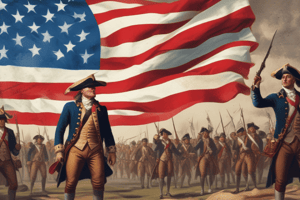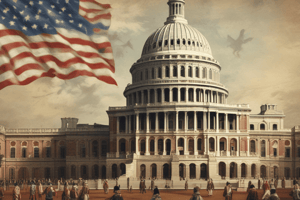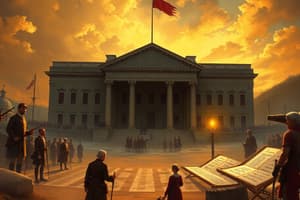Podcast
Questions and Answers
What was unique about Thomas Jefferson's inauguration?
What was unique about Thomas Jefferson's inauguration?
- It marked the first peaceful transfer of power between parties in the United States. (correct)
- It was the first inaugural ceremony held in Washington D.C.
- He was inaugurated without taking an oath of office.
- He was inaugurated with military honors.
What was the main objective of the Embargo Act of 1807?
What was the main objective of the Embargo Act of 1807?
- To punish Britain for its trade restrictions on France.
- To restrict British trade with France.
- To protect American shipping from British impressment. (correct)
- To blockade European ports and seize American ships.
What was the result of Commodore Oliver Hazard Perry's victories on the Great Lakes in 1813?
What was the result of Commodore Oliver Hazard Perry's victories on the Great Lakes in 1813?
- The war ended with the signing of the Treaty of Ghent.
- The British were forced to abandon their attack on Lake Erie. (correct)
- The American fleet was destroyed, and Perry was captured.
- The British gained control of the Great Lakes.
What was the name of the group of southern and western representatives that pushed for a stronger national defense?
What was the name of the group of southern and western representatives that pushed for a stronger national defense?
What was the main reason why the United States was unprepared for war with Britain?
What was the main reason why the United States was unprepared for war with Britain?
What was the main purpose of the Monroe Doctrine?
What was the main purpose of the Monroe Doctrine?
What was the major achievement of the Northwest Ordinance of 1787?
What was the major achievement of the Northwest Ordinance of 1787?
What was the significance of Shay's Rebellion?
What was the significance of Shay's Rebellion?
What was the main difference between the Virginia Plan and the New Jersey Plan?
What was the main difference between the Virginia Plan and the New Jersey Plan?
What is the primary purpose of federalism?
What is the primary purpose of federalism?
Who was the main author of the Federalist Papers?
Who was the main author of the Federalist Papers?
What is the process of proposing an amendment to the US Constitution?
What is the process of proposing an amendment to the US Constitution?
Study Notes
The Articles of Confederation
- The Articles of Confederation were written by a committee consisting of John Dickinson, Thomas Burke, and Benjamin Franklin.
- It took 13 states to ratify the Articles of Confederation.
- The powers of Congress under the Articles of Confederation include:
- Declaring war and negotiating treaties
- Regulating foreign and domestic commerce
- Appointing military officers
- The states had significant powers during the Articles of Confederation, including:
- Collecting taxes
- Regulating commerce within their borders
- Maintaining their own militias
- States cooperated under the Articles of Confederation through:
- Interstate agreements
- Border disputes
- Joint military efforts
- Three major weaknesses of the Articles of Confederation include:
- Lack of central authority
- No power to levy taxes
- No national judiciary
Northwest Ordinance
- The Northwest Ordinance of 1785 established rules for governing the Northwest Territory.
- The Northwest Ordinance of 1787 allowed for the creation of new states in the Northwest Territory.
Shay's Rebellion
- Shay's Rebellion was a populist uprising in Western Massachusetts in 1786-87.
- The rebellion was led by farmers and debtors who were dissatisfied with the government's response to economic hardship.
- The significance of Shay's Rebellion was that it highlighted the weaknesses of the Articles of Confederation and led to calls for a stronger central government.
Constitutional Convention
- The Annapolis Convention failed to achieve its goal of revising the Articles of Confederation.
- The Virginia Plan proposed a strong central government with three branches, while the New Jersey Plan favored state sovereignty.
- The Great Compromise (also known as the Connecticut Compromise) created the legislative branch with two houses: the House of Representatives and the Senate.
The Constitution
- Article I of the Constitution forms the legislative branch.
- Article II of the Constitution forms the executive branch.
- Article III of the Constitution forms the judicial branch.
- Federalism is a system of government where power is divided between a central authority and smaller units (such as states).
- Issues surrounding federalism include the balance of power between the federal government and the states.
The Federalists and Anti-Federalists
- The Federalists, led by Alexander Hamilton, supported a strong central government and the ratification of the Constitution.
- The Anti-Federalists, led by George Mason, opposed the Constitution and favored state sovereignty.
- James Madison was the main author of the Federalist Papers, a series of essays in support of the Constitution.
The Bill of Rights
- The First Amendment guarantees freedom of speech, religion, and assembly.
- The Second Amendment guarantees the right to bear arms.
- The Third Amendment prohibits the government from quartering soldiers in private homes without consent.
- The Tenth Amendment reserves powers not delegated to the federal government to the states or the people.
Amendments and Ratification
- An amendment can be proposed by Congress or a national convention.
- An amendment is ratified when three-fourths of the states approve it.
Thomas Jefferson and Federalism
- Thomas Jefferson was a strict constructionist who believed in limited government power.
- Jefferson's inauguration was unique because it was the first transfer of power from one party to another.
- Jefferson did away with the Federalist policies of tariffs and the Bank of the United States.
Louisiana Purchase and the Tripolitan War
- The Louisiana Purchase added a vast territory to the United States, which Jefferson initially wanted to buy from France.
- The Tripolitan War was fought against the Barbary States, and its outcomes included the destruction of the Barbary pirate fleet and the payment of tribute to the pirate states.
The Embargo Act and the War of 1812
- The Embargo Act of 1807 prohibited American ships from trading with foreign ports.
- The War of 1812 was fought against Britain over issues such as impressment of American sailors and trade restrictions.
- The British colonies in North America were located in what is now Canada.
- The Orders in Council were a series of British decrees that blockaded American ports and seized American ships.
Monroe Doctrine
- The Monroe Doctrine stated that the United States would not tolerate European colonization in the Americas.
- James Monroe agreed to run for president on the conditions that he would support the nomination of John Quincy Adams as Secretary of State and that he would not run for re-election.
- The Adams-Onís Treaty led to the United States purchasing the Florida Territory from Spain for $5 million.
Studying That Suits You
Use AI to generate personalized quizzes and flashcards to suit your learning preferences.
Description
Test your knowledge on the Articles of Confederation, its ratification, powers, and weaknesses, as well as significant events like the Northwest Ordinance and Shay's Rebellion.




